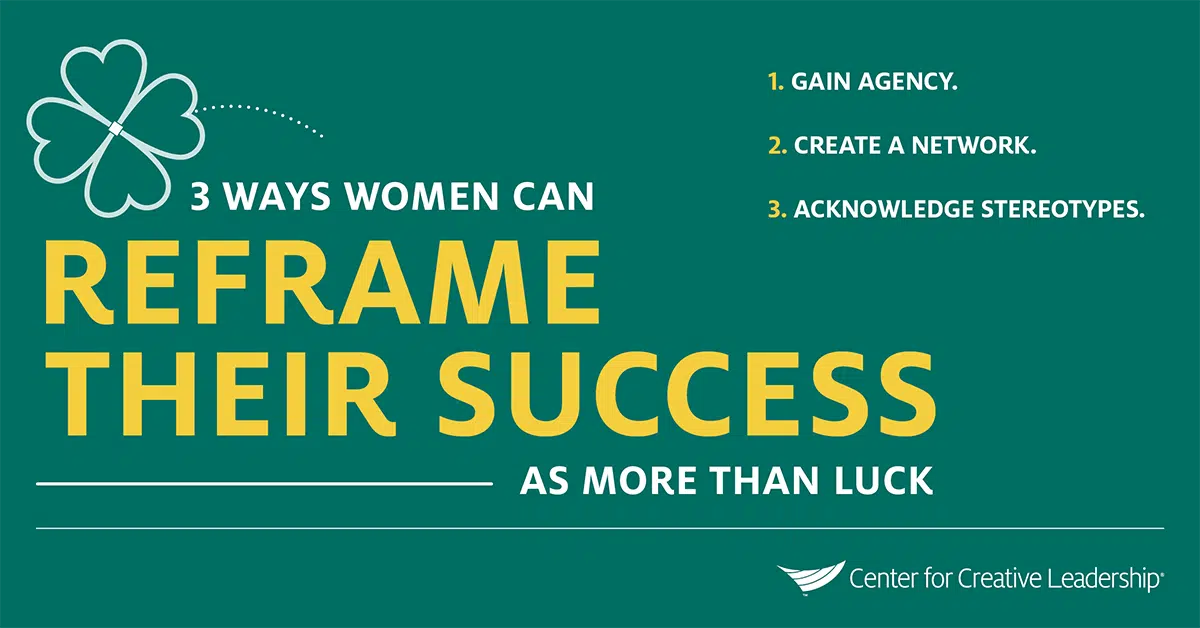Many Women Give “Luck” Credit for Their Success — Should They?
Women in the workplace have a narrative issue. Could the way many women frame their successes be holding them back?
We recently analyzed leadership development interviews from a leading high-profile global consumer goods company. During this analysis, we discovered that nearly 1/2 of all women interviewed attributed their success to “luck,” compared to only 1/3 of men.
In our analysis, women reportedly felt “lucky” that they were surrounded by a good team, had attention from their supervisors, and had access to opportunities, for example.
In fact, it was almost as likely for a woman to chalk up her success to luck as it was for her to say that she worked hard for it.
Women leaders are more than just lucky, so they need to reframe the way they think, vocalize their contributions and work success, and stop subconsciously sabotaging their hard work.
Where does this power dynamic come from, and how can women change it?
Why Women Say They Are So “Lucky”
Maybe it isn’t surprising that many women credit their success to luck. Leadership research shows that there are multiple, measurable double standards impeding women’s success, while similarly advancing men. It’s a double-bind of being seen as competent or likable — but not both.
Are women actually lucky, or are they mistaking equal treatment or equal pay for mere serendipity?
Are women using these passive descriptors to avoid being seen as arrogant or — society’s favorite word — “bossy?”
Are Women the Unlucky Gender?
When most people envision a strong leader, they picture stereotypically male traits: assertiveness, independence, competitiveness. These traits can make for a very fine leader, but when applied to a woman, they become negative descriptors.
As our research found, men become bosses, but women become “bossy.” Women are twice as likely as men to be branded as bossy in the workplace, a trend that underlies the gender stereotypes still inherent in the workforce.
Women are in a catch-22: they must be strong and independent, without being seen as bossy.
The Right Kind of Help: Women Need Sponsors
In our leadership research data, many women considered themselves lucky to have been noticed by supervisors or to work with a specific team. Women with true sponsors really are lucky.
However, women often gain passive mentors rather than sponsors who actively promote them and help them climb the corporate ladder. While women are mentored more often than men, these mentorships produce fewer promotions and are less likely to be provided by a senior executive.
Women are also less likely to have a sponsor. Unlike mentors, sponsors introduce you to the “right” people and use their influence to shield you from company politics. Learn more about why women need a network of champions.
How Women Can Reframe Success as More Than “Just Luck”
3 Tips for Women to Reframe Their Narrative
With all of these seemingly ineffable obstacles facing women, is it any wonder that so few senior leaders are women and that these women tend to give luck more than its fair share of the credit for their success?
Yet there is hope. Women can become owners of their leadership narrative by following these 3 tips:
1. Gain agency.
The first thing women need to do is set goals and make conscious decisions about their career path. Does a “lucky” opportunity help pave the way to a certain goal? If so, then take it, and don’t be afraid to create other opportunities on the same path. Women should use the term “leader” to define themselves in both their own eyes and in the eyes of those around them. As women lead more intentionally at work and at home, they feel greater agency over their careers.
2. Create a useful network.
Women must also take control of their professional network. They must seek out sponsors within an organization who can help provide meaningful insight and guidance. A professional network is not a list of friends, but a symbiotic web of resources that is mutually beneficial to both parties. For example, if a woman wants to be the head of cybersecurity, she should be involved in cybersecurity events and professional groups within her community and industry. This way, she will hear of new opportunities within her chosen career path. Women need a network that works for them.
3. Understand how gender norms contribute to success.
Women need to acknowledge that gender norms and stereotypes exist, and identify how they play into success (or failure). For example, the Ban Bossy campaign seeks to remove the gendered term from playgrounds and workplaces, where females are more likely than males to call women and girls bossy.
Knowing that women are under-sponsored by senior leaders and under-represented in high-level positions and on boards, women must fight the urge to be at odds with one another and instead be allies.
Knowing that women are over-mentored yet under-sponsored, women should support each other and realize that helping a woman advance contributes to advancing women across the workforce.
And it will take more than luck to get there.
Ready to Take the Next Step?
Equip your talented women leaders with more than luck by providing access to women’s leadership development. Or, partner with the experts in our equity, diversity, and inclusion practice to create an organizational culture that attracts, retains, and supports women and people of color.








